You’ve bought some African Dwarf Frogs for your aquarium, but don’t know a whole lot about any potential diseases they might be carrying. Well, these frogs are quite fragile, and this worries you.
Like all other animals, your beloved pet will pass away one day. Under proper care, these beautiful frogs can live for a long period of time. However, whether it is a natural death or an early death because of preventable diseases, matters a lot to you.
If you want to know more about how and why your African Dwarf Frogs may meet their demise, then this article has got you covered! Here we’ll discuss the possible diseases your frog may catch, how to look for symptoms, and how to prevent them.
Why is my pet African Dwarf Frogs dying?
Various diseases are the major reasons for the death of your pet frogs. The most common disease among all frog species is known as bloating or dropsy, where the frog looks like it is full of air and its belly expands like a balloon. However, the frog instead is full of liquid, which causes extreme pain and can eventually lead to your frog’s death.
Another common disease among African Dwarf Frogs is Chytridiomycosis. It is an extremely deadly infection among most amphibians and has led many species to the brink of extinction. The frog infected by chytrid fungus begins to lose color on its skin, and the skin starts to peel from the outer side. This peeling is very different from regular peeling and is pretty obvious visually. The frog also loses its appetite and becomes less active.
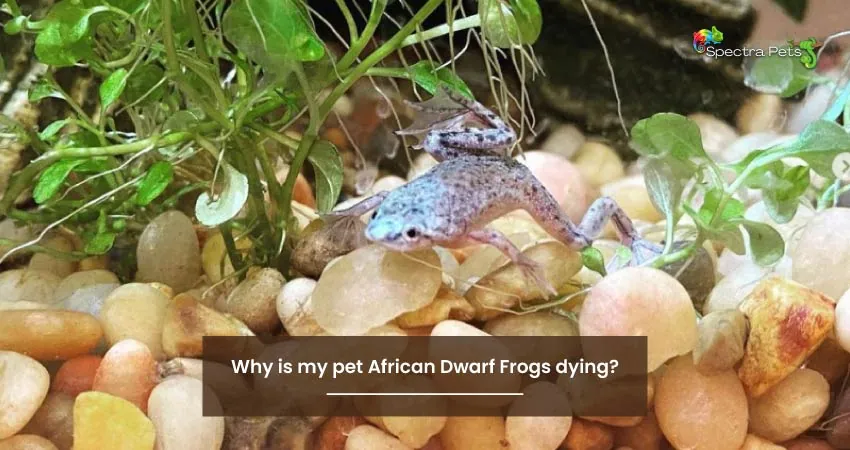
A lot of pet African Dwarf Frogs die from unfavorable tank conditions. If the tank water is contaminated, or if the pH level and temperature are not suitable for them, then it will worsen your favorite amphibian’s health and eventually bring them to their doom.
Lack of nutrition is another probable reason why your frog might be dying. The African Dwarf Frogs are omnivorous creatures that require a lot of protein in their regular diet. Therefore, you need to supply them with live and frozen food that is protein-rich.
If the frog is showing a lack of appetite, then it might be sick. When this happens, your frog needs veterinary attention.
How do you tell if your African Dwarf Frog is sick or dying?
Now that you know more about the probable causes behind your beloved pet’s health issues, it’s time to learn how to identify the exact reason.
When your frogs are close to death, their skin will start to get a paler hue and start shedding. They may have dead skin hanging on their bodies. If it remains a whole day like this, it’s an immediate sign of sickness, and you need to be alarmed. This is because your frog is infected with chytrid fungus, and you need to take immediate action if you want to save your pet.
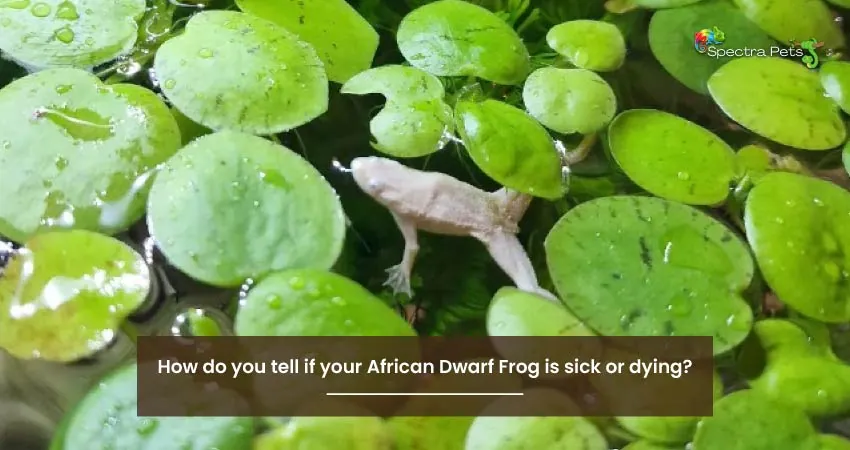
Your frog will have a lack of appetite if it’s sick or on the verge of death. These amphibians are active eaters and will eat at any given chance. New frogs introduced to the aquarium might not be eating, as they require some time to adjust to the new environment. It’s not enough to determine that your frog is dying just from this, as there might be other reasons as well behind your frog’s non-eating behavior.
If the frog is floating on top of the water after showing all the behaviors mentioned above, there are only a few hours left in its lifespan. In this instance, it might be too late to save your frog.
How can you avoid sickness?
Make sure you have set up your aquarium so that it fulfills all the needs of your pet African Dwarf Frogs. I have another article on African Dwarf Frog Tank Setup where you can learn more about this, so have a look!
When picking up your frogs, you must know how to identify healthy ones. Pet stores generally keep healthy frogs and take good care of them. However, when you are out buying any, you should look out for a few specific things that indicate if the frog has any diseases.
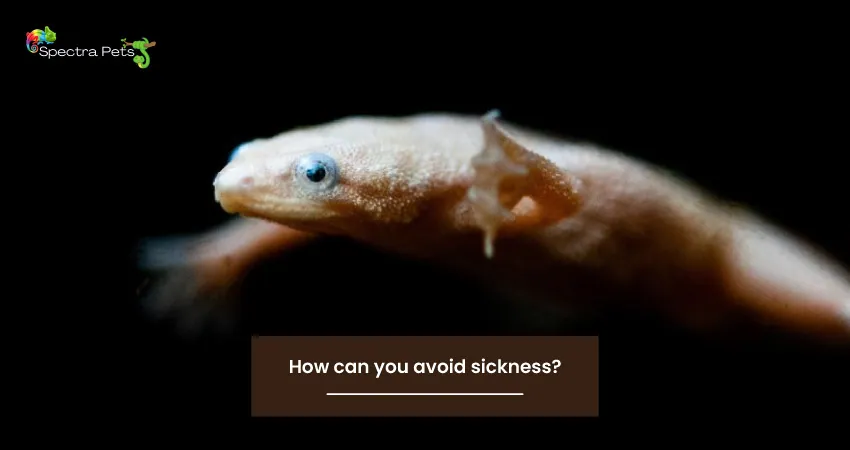
You must avoid frogs that have any white patches, cloudy eyes, a red hue on their legs, or big, inflated bellies. These are various symptoms of dropsy, chytridiomycosis, and other infections.
You also need to cycle your aquarium regularly. Change the water every now and then. If you don’t, bacteria will build up inside, which is quite harmful for all the tank mates living in the aquarium.
No matter how selective and precautionary you become, your frog may still catch diseases. In this situation, be absolutely ready to seek medical help for your animals.
How do you treat a sick African Dwarf Frog?
If your African Dwarf Frog is bloated, you can bathe them with salt mixed into water. The added salt will help to draw out the extra fluid that has been built up in its body. Do not leave them in saltwater for too long, as these are freshwater amphibians and won’t last very long in saltwater.
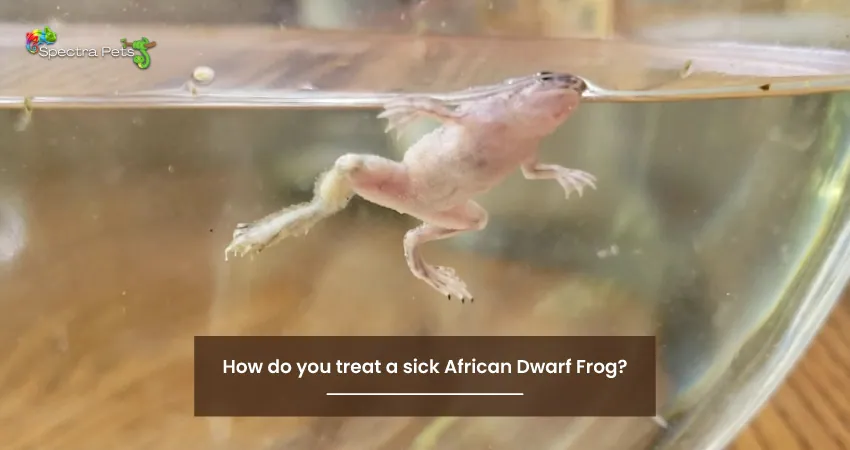
It’s best to seek veterinary help if the frogs show any signs of sickness, as they are professionals and will always know the best way to treat your beloved frogs.
What do you do after your African Dwarf Frogs die?
Most people tend to flush the dead bodies of their frogs down the toilet. I do not recommend this. If your pet amphibians die from bacterial infections or some other contagious sickness, their bodies will only infect other water, and other animals in the vicinity might get affected by this.
Instead, just throw them in the regular trash. Their bodies will just dry out in a day, killing any diseases and bacteria.
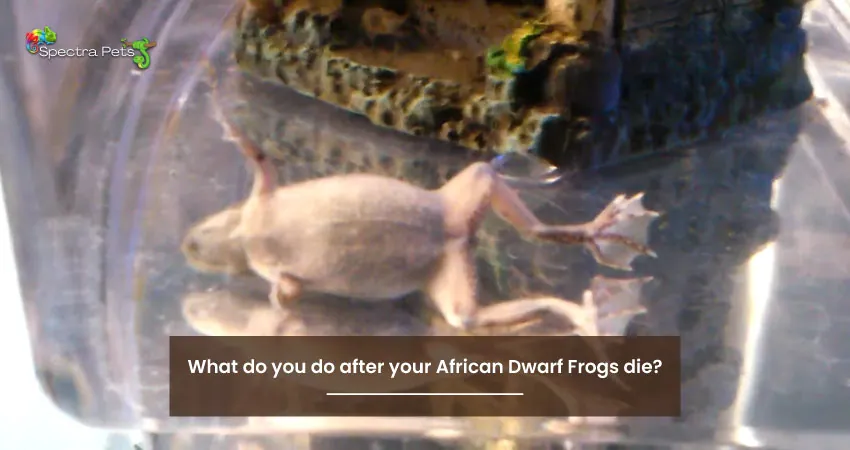
How long do African Dwarf Frogs last?
Knowing the lifespan of your African dwarf frog will give you a great deal of insight into its longevity. You’ll know if your frog died a timely death or was there anything usual and whether you could have done more.
Typically, an African Dwarf Frog under captive care lives anywhere between 2 and 5 years. However, this can be significantly cut short if the amphibian becomes sick or doesn’t get enough food.
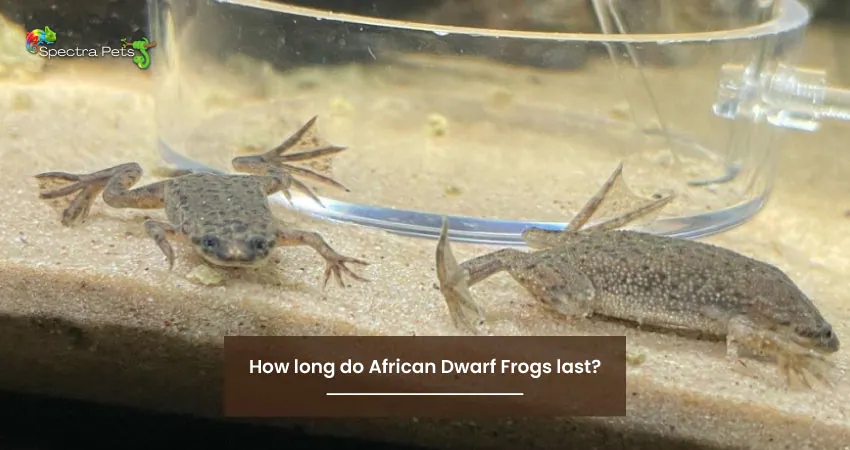
Frequently Asked Questions
Why is the African Dwarf Frog floating at the top of my tank?
These frogs require air for breathing, so they swim up to the surface from time to time. It is a normal behavior. If they, however, stay floating on the surface for an extended period of time, then you need to be worried.
There is either not enough oxygen in the water, or it might be on the verge of dying because it cannot gather any oxygen through its skin because of some skin disease.
Why is the African Dwarf Frog staying at the bottom of the tank?
African Dwarf Frogs are active creatures that swim up and down now and then. If your pet frog is staying at the bottom of the aquarium constantly and not moving at all, it is an indication that they might be sick.
Why does my pet African Dwarf Frog have its belly expanded like a balloon?
This is the sign of a disease called dropsy, which is also referred to as bloating. This is a common disease amongst all frog species. Your frog will look as if it were filled with air. But it is filled with liquid that has gradually built up in its small body.
This disease is contagious and extremely harmful to your beloved pets. You can read about it in detail in my article about African dwarf frogs being bloated.
Do African Dwarf Frogs play dead?
Sometimes, the frogs will flip themselves upside down and not move at all. They show this behavior while trying to avoid predators.
If the anuran is near death, it might look like it’s playing dead by not moving or eating at all.
Therefore, if your pet frog appears dead, it might not just be dead yet, but be on the verge of dying. There might still be some time to save your beloved amphibian. Give it a thorough examination and seek veterinary help if necessary.
Wrapping Up
All life in existence is destined to face death, some sooner than others. If you manage to take proper care of your African Dwarf Frogs, then surely they will be around you for a longer period of time before they have to go away as well.

